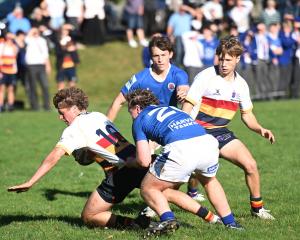David Kirk is probably the perfect example of the student-rugby player mix.
Kirk attended the University of Otago, studying for a medical degree while at the same time, playing rugby for the University club, and eventually Otago, and then the All Blacks.
He would later shift to Auckland, and would lead the national side to its only World Cup victory.
Oxford University beckoned, on a Rhodes Scholarship, and then a career in both business and politics.
So it comes as no surprise that Kirk, now living in Sydney, is a believer in creating rounded rugby players.
"For young men who are professional sportsmen the problem is many of them can't or won't combine some sort of post-school education," he said.
"I'm not just talking about university but even apprenticeships or some other qualification. There are a whole range of things people can do.
"Life needs to be about learning and growing. Being prepared for opportunities when they arrive.
"The difficulty for professional sportsmen is they get all wrapped up in the world of professional sport. They lose all perspective. They have got to realise, it is just one result on Saturday and put that in the context of the next 50 years."
Kirk (48) said when he was in the All Blacks, when they were touring, they always went out and visited art galleries, museums and made the most of the places they were in.
"Sure, when the game was on we switched on and focused on the match. But when you are in places like London, Paris and Dublin you want to make the most of it."
Though he was not close to the professional game, he said focusing on the intensity of the game is not making players any better.
"They are still making the same mistakes we did and in fact are making more decision-making errors. You need to have that ability to relax, and to make decisions under pressure without putting pressure on yourself."
Kirk was disappointed with some of the off-field activities of players that had landed them in trouble.
"It is not good enough. I think it is related to that sense of perspective and context in life . . . They may think they are more important than those around them and that gives them special dispensation."
Kirk felt he could have played in the current era, as he had good speed, which was so important these days.
He felt he would have played for longer, as he headed to Oxford aged 26.
He actually never made the top University Colts side, playing for the Golds his first year at university, before pushing current Otago coach Steve Martin out of the A side in 1980.
He first made the Otago team in 1982, and played 27 games for the union.
Kirk felt he would have to be heavier to play in today's game.
He played around the mid-70kg range, and felt he would have had to be in the 80kg-plus range.
Kirk now lives in Sydney with his wife Brigit, and three boys: Hugo (17), Barnaby (15) and Harry (13).
He said having to combine rugby and study for a medical degree had set him up for life.
"It was busy and you had to accept that some of the things that your mates did you couldn't do. And some of the social things you had to miss," he said.
"I just think there is a lesson for people that you do have to be disciplined to achieve things."
Kirk went for a run around Ross Creek on Friday, an old stomping ground, and said putting in the hard work was always an investment in the future.
Kirk is the president of the New Zealand Rugby Players Association, and said it was a role he enjoyed.
He resigned as chief executive of Fairfax Media last year and has just been appointed to the board of Forsyth Barr.
He was looking to build up a few more director executive positions and to do a variety of things over the next six to 12 months.
Kirk paid $4000 for a University jersey which had been signed by the 19 living All Blacks from the club.
He donated the jersey back to the club.
The club sold all 15 playing jerseys specially made for the celebrations.











